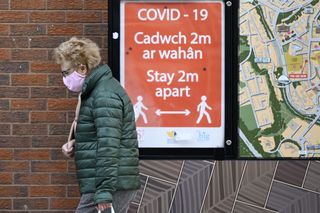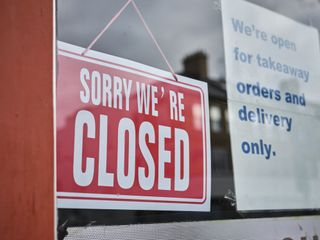What is a circuit breaker lockdown?


What is a circuit breaker lockdown? It's the question everyone is asking as Scotland's ministers are reviewing potential changes to the lockdown rules.
Despite an incredible uptake of the Pfizer, Moderna and Oxford vaccines, and attempts even by younger people to get the second vaccine early, Covid-19 cases are still rising in the UK. While this isn't surprising, as no jab is 100% effective, it's causing concern among health experts and government ministers. Especially since, along with infections, hospital admissions and deaths are also going up.
One of the measures ministers have employed before is a circuit-breaker lockdown, otherwise known as a firebreak lockdown. These lockdowns help to prevent infections, giving the NHS time to recover from the surge.
What is a circuit breaker lockdown?
A circuit breaker lockdown is a short, sharp lockdown that lasts just a couple of weeks. It's a short-term solution to reverse the tide of infections and bring case numbers down.
While the rules feel very similar to when we go back into lockdown, a circuit-breaker is only for a set period of time. After this period is over, people can go about their lives as before.
The idea is that circuit breaker lockdowns are less damaging to the economy, education and people's mental health as they allow people to plan ahead for restrictions.

However, it's debatable as to how effective they really are. Whether these lockdowns work or not entirely depends on how severe the rules are and how much people stick to them during the time that they're enforced.
GoodtoKnow Newsletter
Parenting advice, hot topics, best buys and family finance tips delivered straight to your inbox.
What is a firebreak lockdown?
A firebreak and circuit breaker lockdown are the same thing.
In electronics, a circuit breaker is an automatic electrical switch that is designed to protect an electrical circuit from excess surges of current. While a firebreak is similar, its name comes from the fire prevention method of having a strip of land in a wood or forest where the trees are removed to prevent a fire from spreading.
While Wales called their short lockdown in October 2020 a 'firebreak' lockdown, Northern Ireland called their one in November a 'circuit breaker' lockdown.
Will there be a circuit breaker lockdown in Scotland?
A circuit breaker lockdown is one of the options that health experts are presenting to First Minister Nicola Sturgeon. The country is currently experiencing a rapid rise in cases of coronavirus, following the end of restrictions. However as of August 26, there's been no confirmation that Scotland will be in a circuit breaker lockdown.
Other options include new social distancing rules and vaccine passports, which allow people to prove a double vaccination before entering public events and travelling internationally.
It's likely that freedoms of the summer months will be locked down as we approach winter, according to sources in The Times. During the winter months, health experts are expecting a surge in Covid-19 cases anyway, as there's less chance for ventilation in indoor spaces and the cold weather wears down the body's immune defence.
The changes in restrictions are likely to begin again with some of the most preventative measures. Scottish government guidance already says that face masks will be mandatory in crowded spaces until next year.
“There are two options: You could either put in a circuit breaker, you could shut down completely for a short period. Or you could move back through the stages and say we are going to limit indoors gatherings, we are going to reintroduce distancing,” the source told the paper.
Will there be a circuit breaker lockdown in England?
According to Vaccines Minister Nadhim Zahawi, there's the potential for England to go into a firebreak lockdown before the end of the year.
Mr Zahawi did not deny that a circuit breaker lockdown could be implemented if Covid-19 hospitalisations remain high. But, he said it depends on if people book a booster jab and the booster programme for the elderly and most vulnerable.
He said that the booster programme was his "absolute priority". This is because it would "absolutely help us to transition the virus from pandemic to endemic status". He did warn, though, that the "one-way road towards sustaining the opening of the economy" would only happen "if we do that well".
One idea is to extend the October half-term to two weeks. This would keep children away from school and allow room for the NHS to recover after an expected peak in early October.
But questions over whether we will go into lockdown again have been coming up since March earlier this year. There has been nothing concrete since then to suggest that more restrictions are on the way.
The PM has promised to keep "contingency measures" in place to "help manage the virus during higher risk periods, such as winter". But he also assured the public that the government would do "everything possible" to avoid restrictions.
England's short, sharp lockdown in November last year was to manage the surge of cases before Christmas. And as we know, it really wasn't all that effective. The government had to ditch plans to allow those in upper tiers to mix households over the holiday. They then put the country in a long lockdown in the new year, which only fully ended on July 19.
Importantly though, in November last year there weren't any vaccines available to the general public. We're in a very different situation now compared to even earlier this year. According to the latest government data, 47 million people in the UK have had a first vaccine dose. This works out to be 87% of those over 16-years old. Nearly 41 million people - 75% of those over this age - have also had both doses. This in turn gives 75% of the population a significant chance of avoiding seriously illness and death, shown by the dramatically reduced levels of hospital admissions during this ongoing third wave.
Although it's still important to bear conditions such as long-Covid in mind, it's hospital admissions and deaths that the government value when making decisions about restrictions.
With a circuit breaker lockdown being discussed, many are concerned about whether schools are going to close again before the winter holidays. And further along the line, whether Christmas parties are cancelled for another year.
Will there be one in Wales?
Similarly to England, there are no reports that Wales is going back into a circuit breaker lockdown.
Although, cases are rising in the country since ministers lifted restrictions earlier this month. Wales latest infection rate was 321.7 cases per 100,000 people - based on the seven days leading up to August 20.
First Minister Mark Drakeford has said that he's monitoring the situation and deciding whether to enforce restrictions again.
"We have never said in Wales a move away from restrictions is a one-way street and there was never any turning back," he said at a press conference recently.
However, the country has seen an incredible in coronavirus vaccines in newly-eligible age groups. Across the UK, some 12 to 15 year olds can have the vaccine and 50% of 16 to 17-year olds in Wales have now had their first jab.
The country had a firebreak lockdown starting from October 23 last year. It ended on November 9 and included a ban on all non-essential activity, except if you were a key worker.
Will Northern Ireland go into a circuit breaker lockdown?
There's no confirmation that Northern Ireland will go into a circuit breaker lockdown.
However, Northern Ireland recorded their highest number of coronavirus cases - ever - earlier this month. On Friday August 13, the Department of Health recorded 2,397 more cases and a further nine deaths from the virus.
Doctors are now warning ministers that people may lose their lives to other conditions.
Much like England, Northern Ireland's Stormont ministers announced a firebreak lockdown in October last year.
What would a circuit-breaker lockdown mean?
While it might sound like a good idea in theory, the circuit-breaker lockdown would involve the strictest measures.
In Northern Ireland last year, the hospitality sector closed - apart from takeaways and deliveries. Off-licenses and supermarkets couldn't sell alcohol after 8pm and there was no indoor sport other than at elite level. Close-contact services had to close too, as did mobile hairdressers and make-up artists. However, gyms could remain open for solo training - without any classes.

First Minister Mark Drakeford issued the Welsh firebreak lockdown last year. He told a press conference that all non-essential retail, leisure, hospitality and tourism businesses had to close. This meant that everyone had to work from home wherever possible and stay inside, except for very limited reasons. People could also not meet anyone outside of their households with exceptions for those who live alone.
The FM said at the time, "This fire break is the shortest we can make it. But that means that it will have to be sharp and deep in order to have the impact we need it to have on the virus."
Do circuit-breaker lockdowns work?
England has taken on a short, sharp lockdown before - with mixed results. In November, the government announced another lockdown temporarily to try and curb the virus.
According to research from the Zoe Covid symptom study, in association with Kings College London, the results of the lockdown varied across the country. Cases went down in areas of the north of England which had the highest infection rate. But they rose in the Midlands and continued to rise through the lockdown. Experts believed that this was due to reduced compliance, a result of months worth of restrictions, or a last-minute burst of socialising as the highest rates were in those aged between 20 to 39 years old. People in this age group are also most exposed. They are the most common age group working public-facing jobs, such as in restaurants and bars.
Also, schools didn't close during England's circuit breaker lockdown. This meant the levels of infection in children and young people under 19 at school and university stayed stable.

Grace Walsh is a health and wellbeing writer, working across the subjects of family, relationships, and LGBT topics, as well as sleep and mental health. A digital journalist with over six years experience as a writer and editor for UK publications, Grace is currently Health Editor for womanandhome.com and has also worked with Cosmopolitan, Red, The i Paper, GoodtoKnow, and more. After graduating from the University of Warwick, she started her career writing about the complexities of sex and relationships, before combining personal hobbies with professional and writing about fitness.
-
 Does your child have a balanced play diet? Research psychologist reveals what this is and why your kid might need one
Does your child have a balanced play diet? Research psychologist reveals what this is and why your kid might need oneIt's not all fun and games - play is a crucial part of childhood....
By Dr Amanda Gummer Published
-
 Scientists say pregnancy can make you age faster - and it could add up to three months to your biological age
Scientists say pregnancy can make you age faster - and it could add up to three months to your biological ageThough the effects might not be as dramatic for older mothers...
By Ellie Hutchings Published